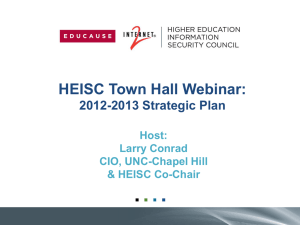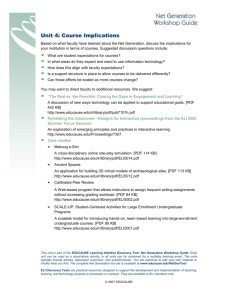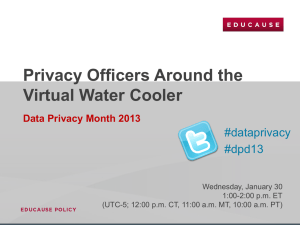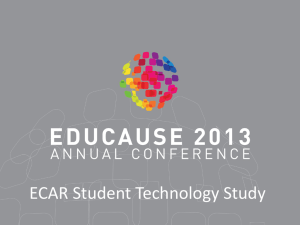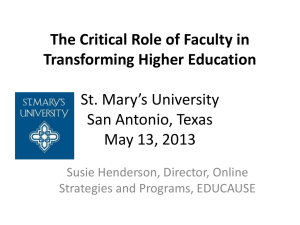Vision - EDUCAUSE.edu
advertisement
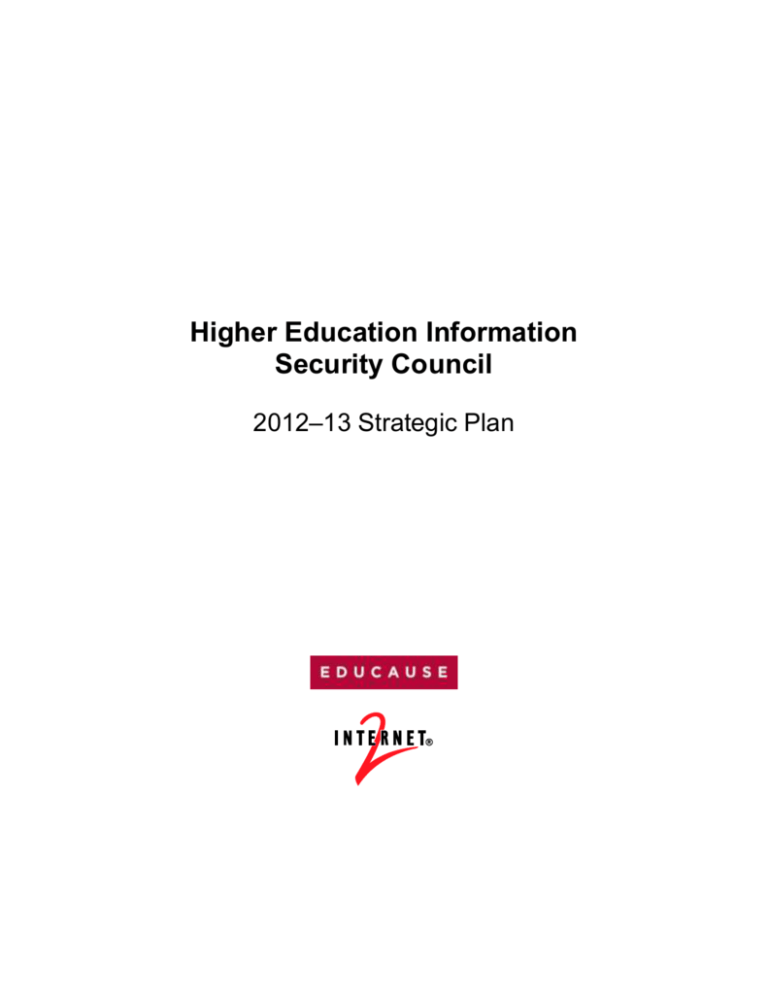
Higher Education Information Security Council 2012–13 Strategic Plan About HEISC Established by EDUCAUSE and Internet2 in July 2000, the EDUCAUSE/Internet2 Higher Education Information Security Council (HEISC) works to improve information security, data protection, and privacy programs across the higher education sector through its working groups of volunteers and professional EDUCAUSE staff that coordinate activities and collaborate with partners from government, industry, and other academic organizations. Through the annual Security Professionals Conference and other EDUCAUSE conferences and websites, HEISC actively develops and promotes leadership; awareness and understanding; effective practices and policies; and solutions for the protection of critical data, IT assets, and infrastructures. For more information, visit www.educause.edu/security. © 2012 EDUCAUSE Higher Education Information Security Council 2012–13 Strategic Plan Vision The Higher Education Information Security Council (HEISC) will guide academic institutions in their quest to safeguard data, information systems, and networks; protect the privacy of the higher education community; and ensure that information security is an integral part of campus activities and business processes. Mission The HEISC mission is to improve information security, data protection, and privacy programs across the higher education sector through its working groups of volunteers and professional EDUCAUSE staff that coordinate activities and collaborate with partners from government, industry, and other academic organizations. Through the annual Security Professionals Conference and other EDUCAUSE conferences and websites, HEISC actively develops and promotes leadership; awareness and understanding; effective practices and policies; and solutions for the protection of critical data, IT assets, and infrastructures. Values We value HEISC’s most prized resource—the people responsible for information assurance who are devoted to excellence and deliver it to their institutions and to each other in the community. We demonstrate this value through devotion to: the principle that we are “all in this together” and that each of us can find strength in the broader community of information security professionals the professional development of our colleagues through outreach, education, and the sharing of best practices and experiences; through this, our community and its members become stronger the practice of respect, openness, and transparency in our interactions with each other We value the role HEISC members play in their commitment to securing technology resources and information entrusted to their care. We demonstrate this value through a commitment to: the nature of higher education—a recognition of the shared governance, equity, diversity, and access that define higher education the execution of our roles at our institutions and within our communities with professional ethics, integrity, and responsibility the protection of information, people, privacy, and confidentiality the principle that a well-functioning, educated, and skilled information security professional is essential to any institution of higher education the commitment to finding innovative yet pragmatic solutions to new challenges and improved solutions to existing ones over time We value collaboration that HEISC and its members foster with other communities in higher education information technology. We demonstrate this value through fostering collaboration and partnerships: with other communities within higher education information technology (networks, information systems, support, etc.) and within higher education generally (pedagogical, research, community service, etc.) with regulatory and policy-developing entities that impact higher education and the broader information technology field HEISC 2012–13 Strategic Plan 1 Goals and Objectives Goal 1: Establish the higher education Information Security Guide as the premier resource for security professionals to help institutions of various sizes and types address complex issues Objectives a. Develop toolkits, primers, and templates that focus on important issues and common procedures. b. Develop a higher education information security maturity model benchmark, incorporating information from the EDUCAUSE Core Data Service. c. Provide guidance on writing security requirements for mobile devices, cloud services, and other issues that might arise on campus. d. Provide guidance for improving security practices in research-intensive environments. e. Provide guidance for determining appropriate duties and a reporting line for a CISO. f. Provide guidance for integrating identity management practices with data-classification models. Goal 2: Improve security-related interorganizational collaboration between and among higher education stakeholders Objectives a. Ensure EDUCAUSE, Internet2, and the REN-ISAC leadership coordinate on actions and plans. b. Review Core Data Service survey data collected on information security and determine if a more targeted set is needed for benchmarking in collaboration with EDUCAUSE Data, Research, and Analytics staff. c. Increase collaboration and coordination with other higher education associations, industry groups, and government. d. Increase interinstitutional collaboration between and among higher education information security professionals. Goal 3: Better inform and educate academic and administrative campus leaders on information security and protection issues by leveraging enterprise risk management (ERM) processes Objectives a. Explore partnering with other associations to organize an ERM summit, of which IT/security is a component. b. Develop a message and presentation template, such as talking points, for information security leaders to present to campus executives. c. 2 Convene groups at various meetings and conferences, like URMIA, NACUBO, AAU, etc. HEISC 2012–13 Strategic Plan Goal 4: Help institutions leverage their investments in information technology products and services to advance information security Objectives a. Outreach to the vendor community to advocate that it incorporates information security at a fundamental design level and addresses the specific needs of higher education. b. Develop resources that draw attention to information security and related products and services. c. Improve information sharing among vendors and higher education institutions. Goal 5: Work together with EDUCAUSE, Internet2, and the REN-ISAC to increase the effectiveness of communication efforts Objectives a. Develop more effective marketing to security professionals, CIOs, and IT leaders in higher education regarding the wealth of resources from EDUCAUSE, Internet2, and the REN-ISAC. b. Raise awareness of the Information Security Guide, existing toolkits, multimedia presentations, and other higher education, industry, and government resources. c. Communicate issues and successes in the higher education sector and target university management. d. Raise awareness of and increase participation in HEISC volunteer opportunities in collaboration with EDUCAUSE and Internet2 memberships. HEISC 2012–13 Strategic Plan 3
